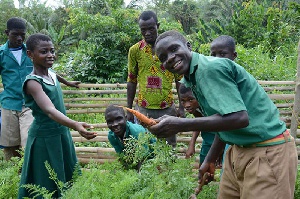 Duabone Primary School Healthy Kids garden
Duabone Primary School Healthy Kids garden
Nestlé, has, through its Healthy Kids Programme, inspired the first school-based vegetable garden in Ghana.
Duabone Community in the East Agona District of the Central Region is the first to successfully pilot the programme.
Duabone RC Primary School volunteered to kick-start the idea in July this year, by planting okra, peppers, and carrots, under the supervision of the Department of Agricultural Extension of the University of Ghana.
It was an intense three months of work for the teachers and pupils of the school, from tillage of land through planting to harvesting.
The chief and elders of the community were introduced to the vegetable garden during the harvest of the foodstuffs.
“Agriculture forms a key part of any country’s development and I am happy children will be able to use this vegetable garden to learn the importance of eating fruits and vegetables,” said Nana Kweku Ansah, the Chief of Duabone community.
Koomson James, a school teacher in the community, added: “The training offered by the University of Ghana facilitated our learning of good gardening and agricultural practices. Parents should be encouraged to engage in vegetable garden activities, as it will help children identify good sources of nutrition.”
A Class Five pupil, Ruth Nyame, stated that she was happy to follow the progress of her school’s garden and witness how the vegetables grow. She had never seen what a carrot seed looked like.
The school is now planning to organise healthy cooking demonstrations to help the pupils appreciate the importance of vegetables in their diet. They also project to practically involve the parents and community members in the cultivation process in the future.
This pilot sets the pace for other schools in the Nestlé Healthy Kids programme to start their own vegetable gardens and related activities, like cooking lessons, in 2016.
This initiative is part of the Nestlé Healthy Kids Programme, which aims to promote healthy diets and lifestyles among schoolchildren.
Implemented in partnership with the Ghana Education Service and the Nutrition Department of the University of Ghana, the programme has reached, directly, 14,000 children through classroom activities since 2011.